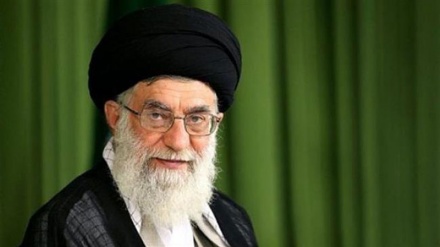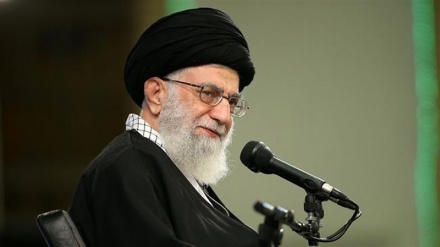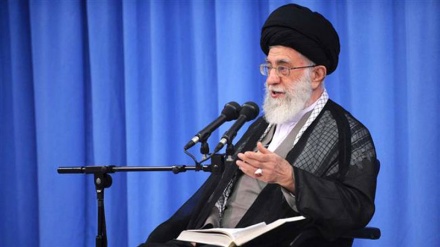In Presence of the Sun (72)
Welcome to this program. The topic of this episode will be freedom with a focus on the viewpoints of Ayatollah Khamenei on the issue.
Freedom is one of the great aspirations of human being. According to the Western view freedom is limited to hedonism and taking the maximal pleasure, especially that of flesh. But Islam maintains a broader view and takes into consideration mental and spiritual pleasures which cover a much wider domain. Once the spirit is released from the fetters of transient material pleasures and carnal desires the ground is set for emergence of valuable merits such as generosity, humbleness, magnanimity, etc. A free-spirited person never keeps aloof from the society and rather lives with fellow-humans. He does his best to help the needy and those in trouble. This sense is culminated in sacrificing one’s life for the sake of others. This was illustrated in the best way by Imam Hussein (AS) at the plain of Karbala on the day of Ashura.
Those who restrict freedom to promiscuity think of nothing but their pleasures and others are worthy till they serve these pleasures. Unbridled freedom of the body translates into excessive hedonism and thus self-sacrifice will be senseless.
The meaning of freedom in Islam differs fundamentally from what the West maintains. As stressed by the Leader of the Islamic Revolution, “Social freedom, which is deemed so valuable in Islam, is harmful if it used for dissipating precious spiritual or material products of a nation. Definite and fixed values and realities restrict this freedom. The freedom which is not accompanied by observance of ethics and religious values will cause debauchery and damaging the rights of individuals. That’s why the freedom which is devoid of religious values and religiosity will cause troubles in different fields just like what we witness in the west.”
Freedom has always been an ambition of human beings throughout the history. It included emancipation of the slaves, liberation from the oppression of tyrants and so on. Ayatollah Seyyed Ali Khamenei describes freedom as part and parcel of the Islamic teachings, saying, “In contrast to some of the concepts stemming from the west, freedom has a long history in the old Islamic heritage and is not an imported concept from the west. It has been there in the nature of Islam, the religious texts and the practice of the infallible [leaders] as Islam incarnate. The issue of freedom is one of the notions that have been repeatedly and frequently accentuated in the holy Qur’an and the words of the Imams (AS). Our belief in freedom and securing the rights of citizenship in social issues, too, is deep-rooted and based on religious foundations.”
Ayatollah Khamenei opines that freedom has its specific framework. He likens unconditional freedom to poisonous foods and believes that even the countries masquerading as the flag-bearers of liberty and freedom have set strict laws and conditions for freedom. The Leader states, “Freedom is different from being unbridled. Freedom is differs from abandoning every code. Freedom- as a great divine bounty- has its own code. Freedom is meaningless without codes. If somebody wants to distribute heroin and other substances poisoning the body and ruining families, one cannot be indifferent toward this. That we see some people, using art, expression, various tools and money, mislead the people, attack people’s faith and infiltrate in the Islamic and revolutionary culture of the people; then we just sit and watch saying that this is freedom; such a freedom doesn’t exist nowhere in the world! Nowhere in the world.
Even in the countries which claim freedom there are some redlines which are very strict. You see, in the European countries no one can speak about the holocaust which is not clear whether it has really happened or not at all; and if yes how was it. Expressing views on holocaust, doubting holocaust is considered as one of the biggest sins and prevented. The individual is detained, imprisoned and judicially prosecuted while they claim freedom. What they consider as redline they resist for it in any way possible. Then how do they expect us to ignore our ideological and revolutionary redlines of our country and youth?”
Leader of the Islamic Revolution, Ayatollah Seyyed Ali Khamenei, says, “Those who consider pleasure-seeking as an ideal issue and a value and promote hedonism, which is a souvenir of western culture,; well one takes pleasure in drug addiction, another one likes sexual desires, a third one enjoys beating this and that; they [westerners] permit whatever is the source of pleasure for somebody; we cannot be indifferent against these things.”
According to the Qur’an man can differentiate between good and bad. He can recognize descent acts from indecent ones. In ayah 8 of surah Shams God says that He has inspired the human soul with the ability of discernment between its vices and virtues. Therefore, due to such a power of recognition, human being is free to choose vices or virtues. In addition to the innate ability to discern between good and bad, human being is a wise creature; hence the cognizance based on the intellect is a real one. Therefore, it can be said that the intellect makes man a selective being so that his intellect leads to his freedom.
The Islamic Revolution of Iran, which emerged with the motto of “Independence, Freedom and Islamic Republic”, has its roots in the Islamic instructions. Ayatollah Khamenei says, “The main base of human’s freedom in Islam is monotheism. That focal point is monotheism. Monotheism is not limited to the belief in God. It means belief in God, disbelief in rebels, servitude of God and non-servitude of other than God. ‘Come to a word common between us and you: that we will worship no one but Allah, and that we will not ascribe any partner to Him.’ It hasn’t been said: do not ascribe anybody to God but: do not ascribe anything to Him. It means if you obey your habits without reason this is contrary to monotheism. If you obey human beings this is the same. If you obey social systems it is the same. Where the end is not in accordance with the divine will all of these are ascribing partners to God. And monotheism means repudiation of this polytheism. ‘So, one who disavows the Rebels and has faith in Allah has held fast to the firmest handle.’ There is disavowal of the Rebels and then faith in God. This is the meaning of freedom. It means you are delivered from all constraints except servitude of God.”
RM/SS


